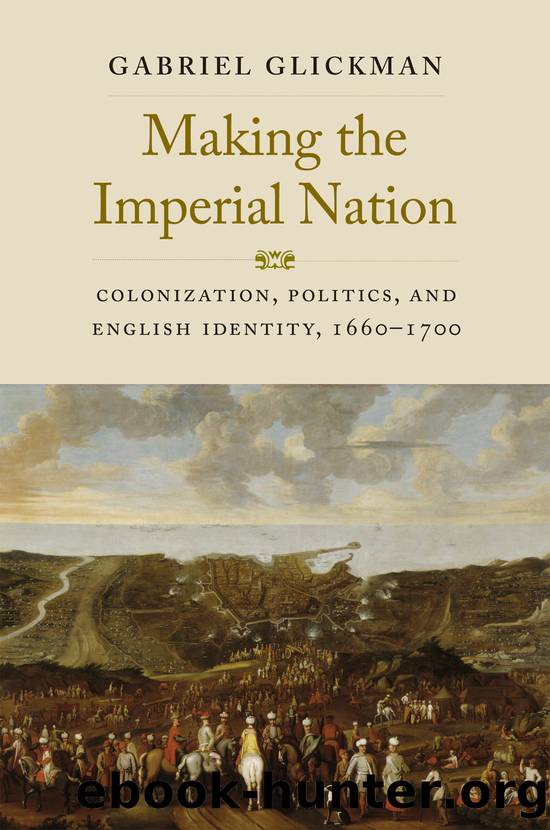Making the Imperial Nation by Gabriel Glickman

Author:Gabriel Glickman
Language: eng
Format: epub
ISBN: 9780300255065
Publisher: Yale University Press
7
âPopery,â Europe, and the Crisis of English Overseas Expansion, 1675â1688
BY THE MIDDLE OF THE 1670S, any lingering domestic consensus in favor of colonization was cracking apart. The infrastructural strains on the overseas provinces, the wars they provoked and the wounds they received, made the expansion of the realm appear, for many observers, less a projection of national strength than an exposure of painful political and military deficiencies. In the wake of the Third Anglo-Dutch War, concerns over the fiscal burden of colonial ventures began to escalate toward a more urgent call for a change of course to prevent permanent national and moral decline. These tensions reached a crescendo between 1675 and 1683 in a chain of controversies, playing out simultaneously across different precincts of the Stuart domain. As shown in Chapter 5, rebellion in the Chesapeake and the Anglo-Indian conflict across New England cast light on the vulnerabilities of American settler colonies and pushed the Crown toward a program of self-assertion and centralization that was freighted with political risk. In the Mediterranean, the advance of the Moroccan Alaouite Empire started to exert an irreversible toll in blood and treasure on the troubled settlement at Tangier and provoked a bitter debate over the wisdom and rectitude of Charles IIâs intended North African empire. All of these developments collided with a domestic cataclysm that was threatening to bring the kingdoms of Charles II to the brink of civil war. After 1675, loose Country networks began to converge into an organized opposition to the court, with critics tearing into Francophile, Catholic, or autocratic tendencies detected in the conduct of domestic and foreign policy. The unrest intensified in 1678, when the exposure of an apparent âpopish plotâ provoked a parliamentary bid to exclude the duke of York from the royal succession. The resultant confrontation splintered the realm into two rival partiesââexclusionistâ Whigs and loyalist Toriesâwith clashing manifestos for the redemption of the kingdom, and the banishment of its traitors and fanatics.
The relationship between domestic and colonial developments in the later 1670s, long neglected in modern scholarship, is now being recovered. Recent studies have shown how discontent with the Crown in English America was stimulated not merely by colonial grievances, but also by greater international fears over the safety of liberty and true religion. News of distempers in Westminster crackled along sea roads and shipping lanes, while boatloads of Huguenot refugees decamped across different parts of English America, and anxieties over the resurgence of militant international Catholicism spread out through the arteries of the Stuart empire.1 Yet if colonial turbulence is increasingly studied in the context of frictions within the mother kingdom, the role of the overseas dominions in the crisis of English domestic politics has yet to be explored. The link between the two theaters has been sketched overwhelmingly in a way that asserts the primacy of the Old World, and the ripple effect of its divisions on affairs beyond the Atlantic. Here I offer a more reciprocal analysis of the relationship and suggest
Download
This site does not store any files on its server. We only index and link to content provided by other sites. Please contact the content providers to delete copyright contents if any and email us, we'll remove relevant links or contents immediately.
The Secret History by Donna Tartt(16668)
The Social Justice Warrior Handbook by Lisa De Pasquale(11495)
Thirteen Reasons Why by Jay Asher(7803)
This Is How You Lose Her by Junot Diaz(5801)
Weapons of Math Destruction by Cathy O'Neil(5049)
Zero to One by Peter Thiel(4838)
The Myth of the Strong Leader by Archie Brown(4796)
Promise Me, Dad by Joe Biden(4459)
Beartown by Fredrik Backman(4436)
Stone's Rules by Roger Stone(4423)
How Democracies Die by Steven Levitsky & Daniel Ziblatt(4418)
The Fire Next Time by James Baldwin(4352)
100 Deadly Skills by Clint Emerson(4089)
A Higher Loyalty: Truth, Lies, and Leadership by James Comey(4042)
Rise and Kill First by Ronen Bergman(4025)
The David Icke Guide to the Global Conspiracy (and how to end it) by David Icke(3895)
The Farm by Tom Rob Smith(3880)
Secrecy World by Jake Bernstein(3791)
The Doomsday Machine by Daniel Ellsberg(3740)
